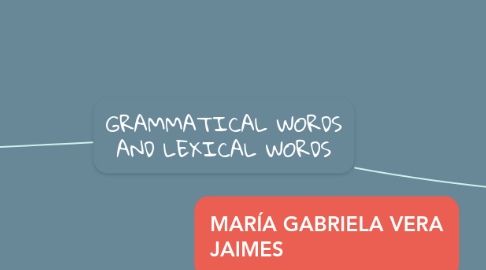GRAMMATICAL WORDS AND LEXICAL WORDS
by gabriela vera

1. MARÍA GABRIELA VERA JAIMES
2. 6. Question words: Are words used to request information about people (who), things (what, which), time (when), places (where). reasons (why), quantity (how much/many) and details (how).
3. 5. Modals: A modal is a type of auxiliary that is used to express ability (can, could), permission (may), suggestion (shall, should), request (would), comman (will) or obligation (must).
4. There are subject pronouns (you, he, they), object pronouns (me, her, us), possesive adjectives (my, his, your), possesive pronouns (hers, ours, theirs) and reflexive pronouns (yourself, herself).
5. 4. Pronouns: Words that substitute a noun or a noun phrase.
6. There are prepositions of time (on, in, at, for, ago), place (by, below, over) and some others such as about, off, from.
7. 3.Prepositions: are worlds used to link nouns and pronouns to ther words within a sentence.
8. -Subordinate: Join independent and dependent clauses (because, since, as, whereas...)
9. -Correlative: Are pairs of conjunctions that work together (either/or, neither/nor, not only/but also).
10. -Coordinate: Help join words, phrases or clauses wirh equal grammatical rank in a sentence (for, and, nor, but, yet).
11. 2. Conjunctions: are words used to link words, phrases or clauses together.
12. They can be definite (the), indefinite (a, an), demostrative (this, that, these, those), posserive (your, his, our), quantifiers (much, many, some), numbers, distributives (all, both, each) and difference words (one, another).
13. 1. Determiners: are words placed in front of a noun to make clear what the noun refers to.
14. -Countable nouns: As the name says, are those that can be counted. For example: proper nouns (Mark), common nouns (dog), masculine/femenine nouns (lion, lioness) and compund nouns (ladybug).
15. GRAMMATICAL WORDS: Are words that have less charge of meaning and are used to connect ideas.
16. -Verbal adjectives: Verbs with ing or ed anding that act as adjectives. Ex: She is annoying.
17. Post-positive: Are adjectives that follow the noun they modify. Ex: This is the best hotel avaliable.
18. -Predicative: The adjective doesn't need to go before the noun. Ex: I think Mark is well-organised.
19. -Attributive: The adjective goes before the noun. Ex: My dad bought a new house.
20. -Syntactical: (sentence)
21. -Morphological: (words) can be simple (green, intelligent) or compound (middleaged, overrated)
22. 4. Adjetives: Are used to provide information about nouns.
23. There ar adverbs of manner (easily, badly), degree (really, almost), evidential (absolutely), frequency (sometimes, normally), time (today, tomorrow), hedging (sorta, kinda), place (here, there).
24. 3. Adverbs: Are words that modify verbs, adjectives and sentences.
25. -State verbs: are the ones that can't take a progressive aspect. Ex: Onions taste reallt bad (sensory). They believe in god (mental). The shirt costs $15 (measurement). I love the rain (emotions). I own 7 houses (relatinship).
26. -Linking: Are used to connect ideas. Ex: The kid looks sleepy.
27. Intransitive: Don't carry a direct object. The
28. Transitive: are followed by a direct object. Ex: He paints the wall.
29. -Action verbs: Express the main action in the sentence.
30. 2. Verbs: Are words used to express an action
31. -Non-countable nouns: Are concepts that can't be counted as separated elements. For example: mass nouns (rice), whole nouns (family), abstraction (love), academic areas (biology) and verbal nouns (teaching.)
32. 1. Nouns: Are words that are used to identify people (Mark), things (chair), places (Colombia), emotions (sadness)...
33. LEXICAL WORDS: Are the ones that have a complete meaning and used to convey information.


